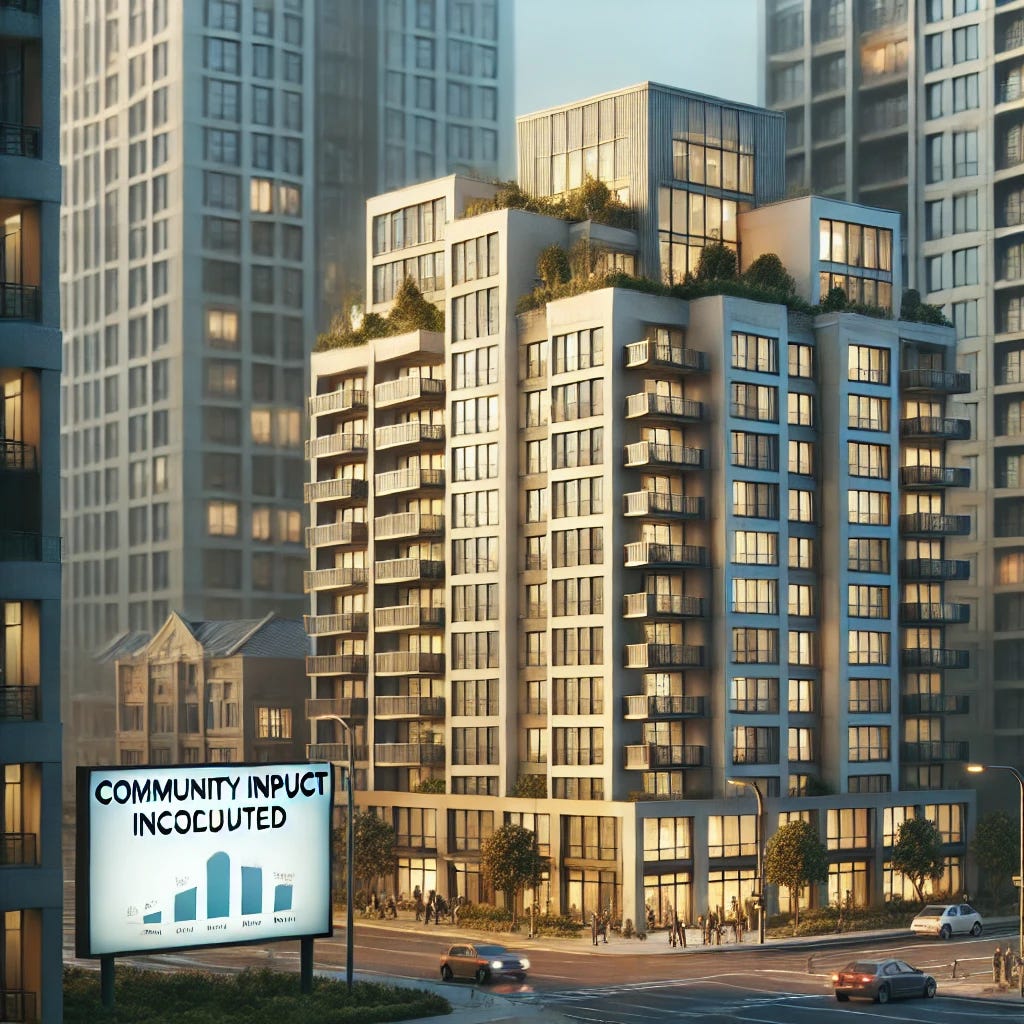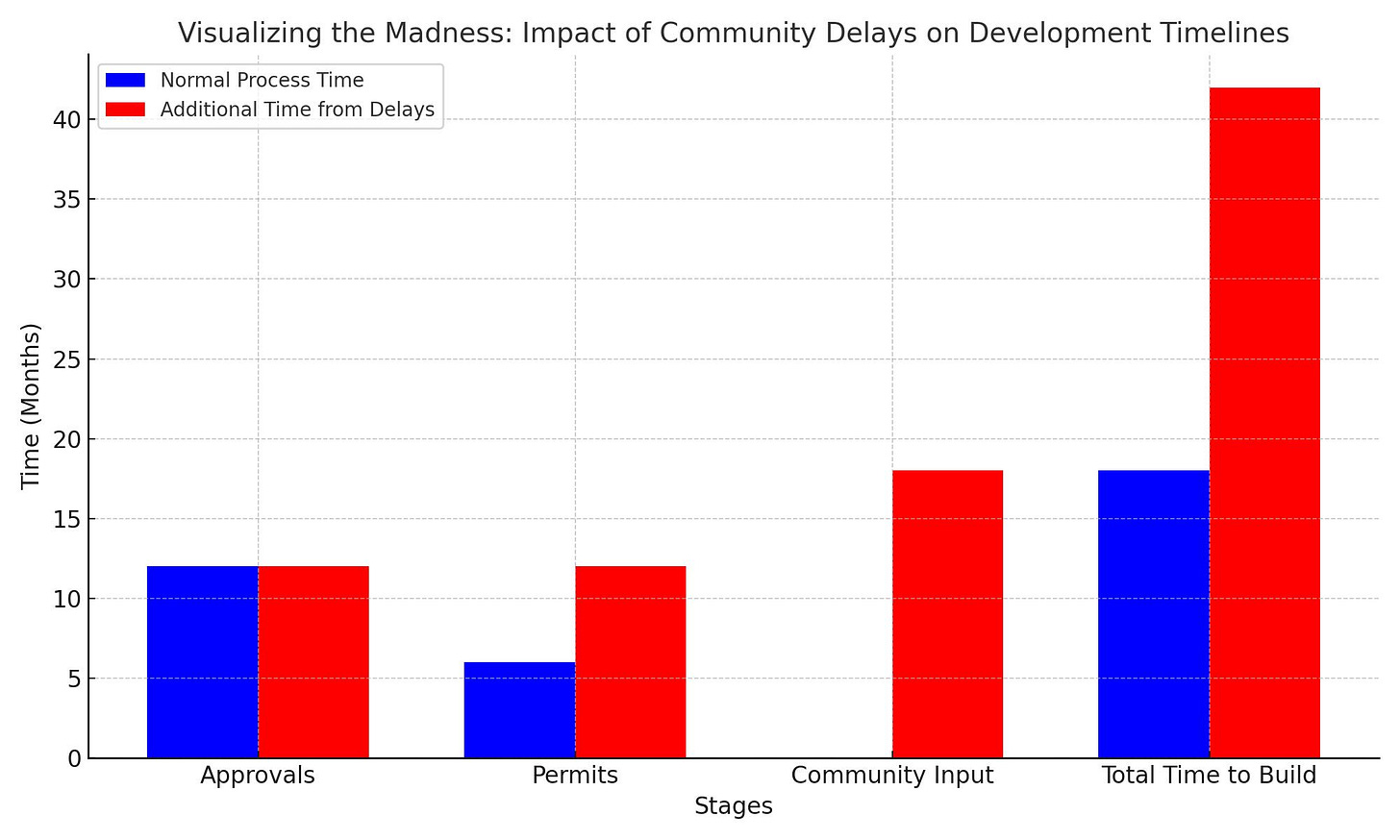How Community Meetings Slow Down Development
NIMBYs, Meetings, and the Art of Housing Delays: A Developer’s Lament
Imagine this: You’ve spent years carefully planning a real estate development. You’ve jumped through every bureaucratic hoop the city can throw at you. You've hired the consultants, adjusted designs for every zoning requirement, and presented to the city council. Then, just as the finish line comes into view, you’re hit with a new obstacle: the dreaded community meeting.
Who attends these meetings? It’s not the eager young family searching for a rental unit. It’s not the professionals tired of their 90-minute commutes. No, it’s often those whose primary goal is to ensure nothing changes, ever. Enter the NIMBYs (Not In My Backyard enthusiasts), armed with Binders and papers about "shadows" and "traffic."
But why should your project—greenlit by the city, compliant with every regulation—be subject to another round of scrutiny from Karen and Bob, whose primary qualification is "owning property nearby"? Let’s unpack this madness.
How Community Meetings Slow Down Development
The numbers don’t lie:
A report by the Urban Land Institute (2023) found that community input processes can delay projects by an average of 18 months. That’s 18 months of carrying costs, 18 months of inflated construction budgets, and 18 months of not putting new housing on the market. Read more.
In Toronto, a 2023 article from The Globe and Mail highlighted how prolonged consultations added $30,000 per unit to project costs on average. Read more.
Visualizing the Madness:
Below is a chart showing the normal project process and the time added due to community delays:
(Chart illustrating the significant timeline expansion due to excessive community input.)
Why the Hell Is It Anybody Else’s Business?
Let’s say the city—with its trained planners and elected officials—has deemed your project worthy. Shouldn’t that be the final word? After all, nobody consults the neighborhood when the city decides to repave the roads or build a new library. Why is real estate development singled out for this extra layer of pseudo-democracy?
Perhaps it's because housing, unlike roads or libraries, is tied to private profit. But here's the twist: private profit isn't the enemy—it's the engine. Developers take financial risks that result in housing supply. By delaying projects, the same people complaining about housing affordability are exacerbating the very problem they’re protesting against. It’s like cutting off your WIFI to complain about slow internet speeds.
The Cost of Doing Nothing
Every delay has consequences:
Fewer Units: Each delayed project means fewer homes for people who desperately need them. According to a 2023 article in the Toronto Star, Ontario faces a shortfall of over 1.5 million homes by 2031. Read more.
Higher Costs: Holding costs for developers balloon with every delay. Guess who ultimately pays? That’s right, the future tenants and buyers.
Economic Stagnation: Housing isn’t just about homes—it’s about jobs and GDP growth. According to the Building Industry and Land Development Association, delays in development approvals cost the GTA economy $2 billion annually. Read more.
Smaller and Fewer Units: In many cases, community meetings result in the project being trimmed back to appease the loudest voices in the room. Larger buildings are scaled down, reducing the number of units or their size to the point where the project barely addresses the housing crisis. The irony? The same Karen complaining about shadows now has fewer neighbors to cast them on.
The Developer’s Take
Let’s be real: The same people who shout “No more traffic!” at meetings are also yelling “Why is housing so expensive?!” on Twitter. The irony is almost too much to bear.
Why do we listen to the vocal minority of neighbors whose chief qualifications are owning a email list of neighbors and taking over public meetings? Do we allow random spectators to weigh in during brain surgeries? Do chefs pause to ask diners how to flambé? Then why should a well-planned, city-approved development bow to opinions like “It’ll ruin my view”? or "There will be more Amazon deliveries".
A Modest Proposal
How about this: If your project is approved by the city, community meetings become optional, non-binding, and capped at 30 minutes. Want to attend? Great. Want to complain? Fabulous—just know it’s for your own catharsis, not to derail the project. And know that this costs me thousands of dollars to have my consultants sit there and answer repetitive questions and listen to misguided comments that often veer into the absurd.
Conclusion: Let’s Build Already!
Community input has its place, but it’s time to streamline the process. The housing crisis won’t solve itself, and every delay makes it worse. Cities have professionals to assess projects—let them do their jobs. Developers aren’t villains; they’re the people building the future. So to the NIMBYs: We see your Binders, and we raise you an approval notice.
Now, if you’ll excuse us, we have homes to build.










Unmitigated claptrap - starting with references to inapplicable American situations - links that do not work - and the gall to cite delays for applications to build far beyond permitted AS OF RIGHT zoning. This is the kind of moaning that gives the industry a bad name. Block busters united. Toronto is literally littered with these "sites" and urban blight not created by residents who were rousted but by developer greed. Builders create livable communities, not expensive chicken coop sized "units" in glass boxes high in the sky. We raise you again and will see you in court - not OLT. Care to debate? Lets - John Hartley 416 6947828